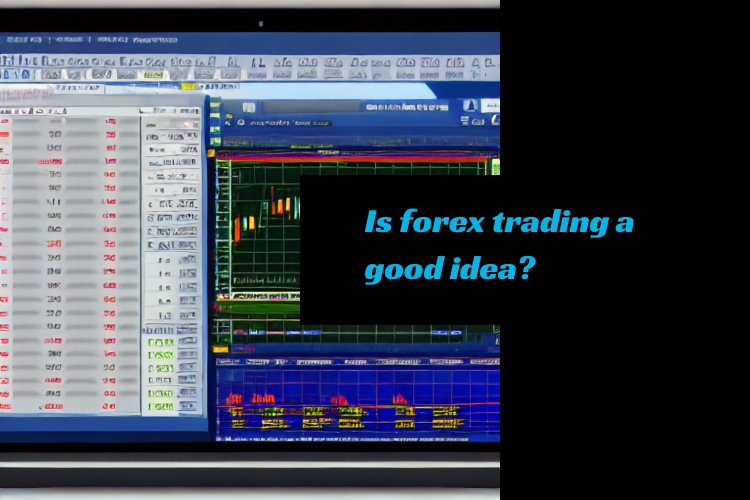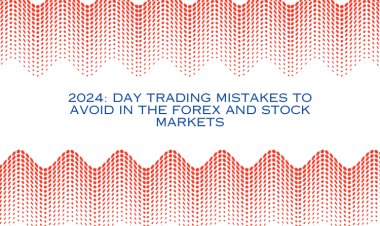Is forex trading a good idea?
Forex trading, often known as currency trading, is a decentralized global marketplace for buying and selling currencies. It is a common type of investment in which currency pairings are traded to profit from fluctuations in exchange rates.

Is forex trading a good idea?
1. Introduction to forex trading
Forex trading, also known as currency trading, is a decentralized global marketplace where currencies are bought and sold. It is a popular form of investment that involves trading currency pairs to profit from fluctuations in exchange rates. Due to its accessibility and potential for substantial returns, forex trading has attracted a lot of attention from people all over the world. However, before you dive into the world of forex trading, it's important to understand its intricacies, benefits, and risks. This article provides valuable insights into the world of forex trading and explains the pros and cons, the dynamics of the forex market, important factors to consider, risk management strategies, effective trading strategies, common mistakes to avoid, and finally answers the question: is forex trading a good idea?
1.1 What is forex trading?
Forex trading, also known as foreign exchange trading, is the buying and selling of currencies. It involves speculating on the price movements of various currencies to make a profit. Unlike the stock market, foreign exchange trading is decentralized and takes place 24 hours a day, five days a week. It is a very liquid market in which trillions of dollars are traded every day.
1.2 History and development of foreign exchange trading
Foreign exchange trading has come a long way since its beginnings. Originally, it was limited to large financial institutions and multinational corporations. However, with advances in technology and the internet, forex trading has also become accessible to private individuals. Today, anyone with a computer and an internet connection can participate in this exciting market.
2. Advantages and disadvantages of forex trading
2.1 Advantages of Forex Trading
One of the main advantages of forex trading is its high liquidity. Because there are so many market participants, you can easily buy or sell currencies at any time. In addition, forex trading offers high leverage, which allows you to control a large position with a relatively small investment. This can increase your potential profits, but it also increases the risk.
Another advantage is the flexibility of forex trading. You can trade from anywhere in the world as long as you have an internet connection. This makes it a suitable option for anyone looking for a flexible source of income.
2.2 Disadvantages of Forex Trading
Forex trading is not without its drawbacks. The high volatility of the forex market means that prices can change quickly, leading to potential losses. It requires a certain level of skill and knowledge to successfully navigate the market. Many beginners underestimate the complexity of forex trading and end up losing money.
Another disadvantage is the presence of scams and unregulated brokers in the forex industry. You must do thorough research and choose a reputable broker to ensure the safety of your money.
3. Understanding the forex market
3.1 Basics of the Forex Market
The forex market works through currency pairs, where one currency is bought and another is sold. The most commonly traded currency pairs include EUR/USD, GBP/USD, and USD/JPY. When trading forex, it is important to understand how the currency pairs work and how they are related.
3.2 The most important participants in the foreign exchange market
Several participants contribute to the liquidity of the foreign exchange market. These include commercial banks, central banks, hedge funds, multinational companies, and private traders. Each participant has its own motivations and impact on market dynamics.
3.3 Forex market sessions and trading hours
The forex market is conducted in different sessions, namely the Asian session, the European session, and the American session. Each session has its own characteristics and trading hours that can significantly affect price movements. It is important to know about these sessions to optimize your trading strategies.
4. Important factors to consider when trading forex
4.1 Currency pairs and their characteristics
Different currency pairs have unique characteristics due to their economic and geopolitical factors. Some currency pairs are more volatile, while others are known for their stability. Knowing these characteristics will help you choose the most suitable currency pairs for your trading style.
4.2 Fundamental analysis in forex trading
Fundamental analysis involves evaluating economic indicators such as gross domestic product, inflation rates, and interest rates to predict currency movements. It is important to be aware of global economic events and their potential impact on the forex market.
4.3 Technical analysis in forex trading
Technical analysis involves studying price charts and using various indicators to identify potential trading opportunities. It helps traders analyse historical price patterns and make informed decisions based on market trends. Learning and applying technical analysis can significantly improve your trading strategies.
To summarise, forex trading can be a good idea for those who are willing to invest time and effort to understand market dynamics and develop effective trading strategies. However, it's important to be aware of the risks involved and approach them with a realistic attitude. Have fun trading! 5. Risk management in forex trading
5. Understanding and assessing risk in forex trading
Foreign exchange trading can offer exciting profit opportunities, but it's important to understand and assess the risks involved. The foreign exchange market is highly volatile, and prices can fluctuate quickly. This means that there is always the possibility of losing money.
To manage risk effectively, it's important to have a thorough understanding of the market and the factors that influence currency movements. This includes keeping up to date with economic indicators, political events, and global trends. When you're aware of the potential risks, you can make more informed trading decisions.
5.1 Set stop-loss and take-profit levels.
Setting stop-loss and take-profit levels is an important aspect of risk management in forex trading. A stop-loss order is an order that automatically stops a trade when the price reaches a certain level. This helps to limit potential losses by preventing them from exceeding a certain amount.
Profit levels, on the other hand, are set to automatically close a trade when a certain profit target is reached. This allows you to lock in profits and avoid the temptation to hold on to a winning trade for too long, risking a reversal.
By setting these levels before you enter a trade, you can ensure that you have a solid strategy and aren't just trading on impulse or market fluctuations.
5.2 Appropriate position size and leverage
The right position size and leverage are essential components of risk management in forex trading. Position sizing is about determining the appropriate amount of capital for each trade depending on your risk tolerance and account size. You mustn't risk too much capital on a single trade, as this can lead to significant losses.
Leverage, on the other hand, allows traders to control larger positions with a smaller amount of capital. While leverage can increase potential profits, it also increases losses. Managing leverage is important to avoid taking excessive risks.
It's recommended to use a conservative position size and moderate leverage to maintain a balanced approach to risk management in forex trading.
6. Strategies for successful forex trading
6.1 Trends following strategies
Trend-following strategies are about recognizing the prevailing market trend and trading in its direction. This approach aims to profit from sustained price movements in a particular direction. Traders using trend-following strategies rely on technical indicators, such as moving averages, to identify and confirm trends.
6.2 Strategies for trading within a range
Range trading strategies focus on trading within specific price ranges or support and resistance levels. Traders using this strategy try to buy near the lower end of a trading range and sell near the upper end to take advantage of price fluctuations between these levels. Range trading can be very effective in sideways or consolidating markets where there is no clear trend.
6.3 Breakout strategies
Breakout strategies trade when the price breaks out of a certain range or a significant support or resistance level. Traders using this strategy aim to catch strong price movements that occur after a period of consolidation. Breakout strategies require careful analysis of price patterns and market conditions to accurately identify potential breakouts.
7. Common mistakes to avoid when trading forex
7.1 Emotional trading and overtrading
One of the biggest mistakes traders make is letting their emotions drive their trading decisions. Fear, greed, and impatience can lead to impulsive and irrational trading, which in turn leads to poor results. It's important to stick to a well-thought-out strategy and avoid overtrading, as this can lead to exhaustion and increased risk.
7.2 Neglecting risk management principles
Neglecting risk management principles is a recipe for disaster in forex trading. Failing to set stop-loss orders, not managing position sizes properly, or ignoring the potential impact of leverage can quickly lead to significant losses. You must prioritize risk management and stick to your established plan.
7.3 The hunt for the "Holy Grail" of trading systems
Many traders waste time and money searching for the elusive "holy grail" that promises guaranteed profits. The truth is that there is no such system. The key to success lies in developing a solid understanding of the market, implementing a consistent trading strategy, and practicing effective risk management.
8. Conclusion: Is forex trading a good idea?
Forex trading can be a rewarding and potentially profitable venture if approached with the right mindset and strategy. However, it is important to understand the risks involved and apply effective risk management techniques. By developing a solid understanding of the market, applying proven trading strategies, and avoiding common mistakes, you can increase your chances of success in forex trading. Don't forget that it requires dedication, discipline, and constant learning. So, is forex trading a good idea? With the right approach, it definitely can. 8. Conclusion: Is forex trading a good idea?
In summary, forex trading can be a potentially lucrative business for those who are well-informed, disciplined, and willing to put in the necessary effort. While it offers the opportunity for high profits, it's important to remember that forex trading also comes with risks. It is important that you inform yourself thoroughly, develop a solid trading plan, and practice effective risk management. Knowing the ins and outs and dynamics of the forex market and applying proven strategies can increase your chances of success in forex trading. Whether or not forex trading is a good idea ultimately depends on your individual circumstances, financial goals, and risk appetite. You need to carefully consider your situation and make informed decisions to determine whether forex trading is in line with your investment goals.
FAQ:
1. Is Forex trading suitable for beginners?
Forex trading can be challenging for beginners as it requires a solid understanding of market dynamics, technical and fundamental analysis, and risk management. However, with the right education, practise, and a disciplined approach, beginners can gradually develop the necessary skills and knowledge to become successful forex traders.
2. How much money do I need to start trading forex?
How much money you need to start trading forex depends on various factors, such as your trading strategy, your risk appetite, and the broker's requirements. With some brokers, traders can open accounts with as little as a few hundred dollars, while others may require higher minimum deposits. It is important that you carefully consider your financial situation and risk appetite before investing an appropriate amount in forex trading.
3. How much time do I need to invest in forex trading?
How much time you need to spend on forex trading depends on your trading style and personal preferences. Forex markets operate 24 hours a day, five days a week, so traders have the flexibility to choose suitable trading sessions. Some traders actively monitor the markets and execute trades throughout the day, while others prefer a more passive approach and spend a few hours a day on analysis and trade management. It's important to find a trading routine that works with your lifestyle and allows you to manage your trades effectively.
4. Can forex trading guarantee profits?
No, forex trading offers no guarantee of profit. Like any form of investment, it involves risks, and the forex market is known for its volatility. The profitability of forex trading depends on various factors, such as market conditions, trading strategies, risk management, and the trader's skills and experience. It is important to approach forex trading with a realistic attitude and understand that profits and losses are part of the trading process. Consistency, discipline, and continuous learning are key to increasing the chances of success in forex trading.
TradeFxP Features
If you choose to be a self-employed retail trader, here are a few things we offer:
- The best trading platform
- No Requotes
- Lowest Spreads
- High-level liquidity
- Interbank connectivity
- Pure STP/DMA/ECN
- Free signals
- Best support
- Crypto Wallet and withdrawals and deposits (USDT)
- Robust CRM
- TradeFxP wallet
- Once you click withdrawal
- Multiple payment options
- Local offices to walk into
- Free VPS
- Free video chat and virtual meetings
- And many more...
If you choose to be a part of our managed account program,
- All of the above +
- 1-2% Daily Profits
- High-level risk management
- Capital protection
- Only 30% of the capital was used.
- Negative balance protection
- Our fee is from the profits only.
- Monthly profit withdrawal
- Wallet system: use it like PhonePe or Google Pay.
- Crypto wallet and withdrawals/deposits (USDT)
- Live monitoring
- MyFxbook Live Monitoring
- Copy Trading
- And many more...
Optional: If you do not withdraw your profits for 2 months, our system will use those profits to trade and will keep your 100% capital safe and secure for margin purposes. This is optional, and if you choose not to be a part of it, you can withdraw your profits from the first month itself.
Why 1-2% daily? Can't your managed Forex account earn more?
Yes, we can! Remember: greed may be good in the beginning, but in the end, it will destroy everything. You and I know that! Many droplets make an ocean! Join the Managed Account Programme and sit back for six months, then look at your account. You'll see that our strategy is good and the best. Do you know what I mean?
If you choose to be a part of us as an introducing broker (IB) or channel partner,
- Industry-best rebates
- Local office support
- Staff support
- Marketing support
- Marketing materials
- And many more...
Having said that,
You can join our Forex Managed Account program and earn 1-2% profits daily. See for yourself by clicking the below link.
Have a great journey, and may you catch some big waves on your way to prosperity!
To see Ai Forex Trading for real, use these credentials.
- Low-risk strategy:
- Mt4: 112018
- PW: Allah@101
- Server: TradeFxP live,
1. To read why you should be with us, click here.
2. To open an account, click here.
3. To see our regulation certificate, click here.
4. To see our news with the IFMRRC, click here.
5. For claims, click here.
6. For the main site, click here.
7. For blogs and articles, click here.
8. Main Website:www.TradeFxP.com



 admin
admin 










